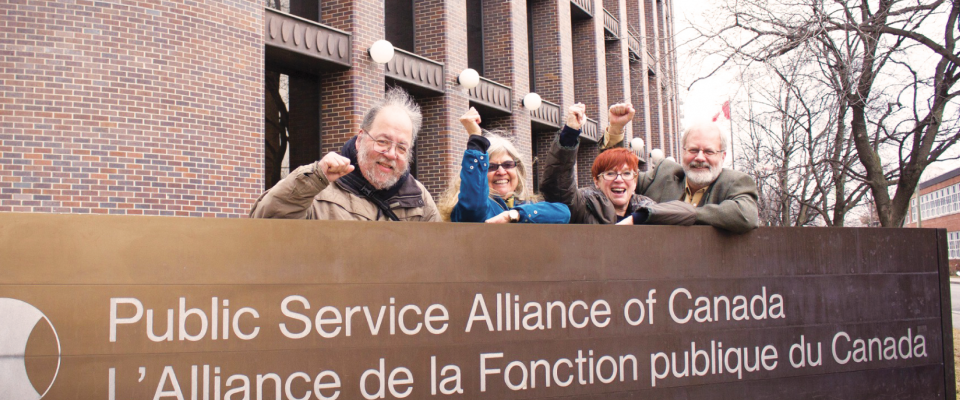In the summer of 1984, four PSAC members fought for the right to be politically active as federal public service workers, paving the way for the stronger, more engaged unions we have today.
It was the dog days of summer, and the Liberals had just called a federal election, hoping to capitalize on their lead in the polls. But when four PSAC members wanted to help their local candidate’s election campaign in Ottawa Centre, they quickly found out they were breaking the law — and launched a seven-year struggle to win political rights.
Under the Public Service Employment Act, government workers were barred from openly participating in partisan politics. This included canvassing on behalf of a political party or candidate, putting up a lawn sign or wearing a campaign button. The rules even restricted government workers from asking questions at election debates and town halls.
But activists Heather Stevens, Ken Clavette, Linda Camponi and Randy Barnhart thought these rules were too restrictive and might violate their rights under the Charter of Rights and Freedoms, introduced in 1982.
They filed for an injunction against the prohibitions to allow them to work on the campaign, but a federal court denied their request. Undeterred, they served the government with a charter challenge. Two more public service workers — not PSAC members — filed a separate legal challenge at the same time.
They knew the legal battle wouldn’t be easy.
Barnhart recalls that in the public service, “you write memos, they go up the line and then you hear back what happened. But this time we were stepping out of that way of dealing with issues and when I saw our names in the newspaper my jaw dropped.”
With the odds stacked against them, Clavette admits he had “little confidence” in winning. But joining the case was a matter of principle.
"For years, I was active in supporting struggles for democracy around the world, and when I learned that Canada itself barred some workers from fully participating in democracy, it seemed outrageously wrong," said Ken Clavette.
The media coverage the case received quickly caught the attention of PSAC National President Daryl Bean. Bean recalled that prohibitions in the Act effectively meant “you worked behind the scenes on campaigns and hoped you didn’t get caught,” and he was eager to throw the full weight — and protection — of the union behind the members’ challenge.
Unfortunately, the federal court’s decision in 1986 fell well short of the sweeping ruling members had hoped for. This led to several appeals over the following five years that eventually led to a hearing in front of the highest court.
In 1991 — just 30 years ago this year — the Supreme Court of Canada finally ruled in favour of PSAC members’ right to political activism. The decision forced the government to amend the Public Service Employment Act and give full political rights to federal government workers with only limited restrictions aimed at ensuring neutrality within the public service.
While the victory firmly secured the right of PSAC members to get involved in election campaigns, the fight on this front is far from over. PSAC continues to push for protections in collective agreements to prevent intimidation and harassment against members involved in important political activism outside of elections and formal union activities — for example, in movements such as Black Lives Matter or in support of Indigenous struggles.
Looking back on their incredible accomplishment Camponi, who is now retired, shared a message for current PSAC members:
“You have political rights — exercise them!”
Contributor: Alroy Fonseca
 Member Login
Member Login



